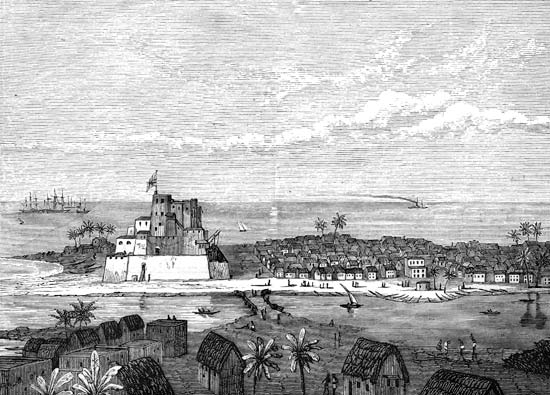 |
| Gold Coast (Ghana) |
The modern West African nation of Ghana was called the Gold Coast until 1957. This small African country is nestled just under the continent as it juts out into the Atlantic Ocean a few miles above the equator. Ancient in its history and traditional in its ethos, the Gold Coast garnered its name from the Portuguese in the 15th century.
Calling the area "da Mina" or "El Mina," denoting the mines, the Portuguese were astounded at the vast deposits of easily accessible gold. By 1472 the Portuguese had built a fort at El Mina to facilitate the emerging Atlantic trade system in gold, ivory, salt, slaves, and timber.
Both historic and contemporary ties made Ghana a major cultural and symbolic icon in the consciousness of African Americans. Although the Gold Coast had several European nations as its primary trading partners, it is its British heritage that defines the contemporary nation.
  |
Envious of Portugal's success and wealth, other European nations began to explore West Africa. By 1600 the Dutch had built several forts along the coastal inlets of the Gold Coast at Komenda and Kormantsil.
In 1637 the Dutch eclipsed the Portuguese as Ghana's major trading partner when they seized Elmina Castle, and in 1642 they confirmed their regional hegemony by forcing the Portuguese to retreat from Fort St. Anthony at Axim. Dutch success gave strength to the ambitions of other European powers.
Thus, the British, Danes, and Swedes started to engage in regular trade as they built their own forts along the Gold Coast. In these areas they exchanged alcohol, cloth, guns, and ammunition for African commercial and human commodities.
Having ruled the area and exploited its wealth for almost 300 years, the Dutch ceded their position in the Gold Coast to the British in 1872. Rushing to confirm the hegemony of the British Empire, England annexed the Gold Coast as a Crown Colony in 1878. But after fighting several wars with local chiefs, the British still only controlled part of the area.
 |
| Gold coast map |
Despite the superior weapons and cohesion of the British military, it was not able to conquer the Gold Coast easily. Many different groups fought the British, who attempted to exploit local ethnic and regional divisions. By allying themselves with the Fante on the coast, the British became the enemies of the Ashanti.
This early and pragmatic decision cost the British thousands of lives over many decades. The Ashanti, foremost among the local groups who fought the British, proved England's most capable foe. From the time that the British sent ambassadors to Kumasi between 1817 and 1821 to discuss peace with King Osei Bonsu (the Asantehene) to their defeat in 1900, the Ashanti rejected British claims.
The Ashanti people were victorious during the 1823–24 Ashanti-Denkyira War, despite a British-Fante alliance that supported the Denkyiras. With superior armaments the British defeated the Ashanti at the Battle of Kantamanto near Dodowa, and in 1831 George MacLean signed a treaty with the Ashanti. Although this did not ensure the pacification of the region, by 1876 the British confirmed their mastery over the region by moving the capital to present-day Accra.
   |
The last war in Ashanti history was led by Nana Yaa Asantewaa, the queen mother. She led an attack on the British fort in Kumasi in 1900 in response to the arrogant demand by Arnold Frederick Hodgson that the king deliver "the golden stool" to the British governor as a sign of surrender. The queen mother, having enormous power in a matrilineal society, led her people to war.
Despite courageous and skillful fighting, the Ashanti were defeated; however, refusing to violate the sanctity of the customary institutions, the elders provided a fake stool to the British as they sued for peace to end the bloodshed and save their nation. The ancient golden stool, the national symbol of sovereignty and power, remained hidden and has never been occupied by a European.
As part of the British Empire, confirmed and carved up at the Conference of Berlin in 1885, Ghana began to emerge as a modern nation-state. The British sent some of the most able African students to study in the United States and Europe. In addition, participation in two world wars allowed many soldiers from the Gold Coast to experience the Western world.
After World War II African soldiers and students returned home; students, members of the privileged elite, had not been indoctrinated as the British had assumed, but returned to begin the process of decolonization.
These educated men and women rejected their comfortable and safe lives as members of the colonial bureaucracy and established a series of political organizations designed to raise the political consciousness of the people.
Many realized that colonization was a form of economic exploitation and that the system was economically unfair to Africans and structured to the advantage of the British. Moreover, having been treated with dignity in Europe and America, these educated and sophisticated Africans chafed under the humiliations they often endured at the hands of local colonial administrators.
Kwame Nkrumah
In particular, Kwame Nkrumah, who had attended Lincoln University in Pennsylvania and read positive messages about being black written by Marcus Garvey and W. E. B. Dubois, began to organize a nationalist movement. He was also influenced by the speeches and rhetoric of the Pan-African Conference held in Manchester, England, in 1945.
From this conference forward, Africans in particular and people of color in general began to question European notions of racial superiority, the administration of colonial justice, and the negative effects of imperial financial systems.
The agitation and anticolonial struggles in the Gold Coast forced the British to grant some local selfgovernment. Finally, despite false imprisonment, violent repression, and the manipulation of ethnic and religious hostilities, Britain had to concede to demands for independence. In 1957 the Gold Coast became an independent nation, the first independent nation in Africa south of the Sahara.